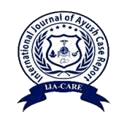Integrative Approach to Aphthous Stomatitis (Qulā‘): A Case Report in the Light of Unani Medicine
Abstract
Aphthous stomatitis (AS), known as Qulā‘ in Unani medicine, is a common ulcerative condition affecting the oral mucosa, causing pain, burning sensation, and difficulty in eating, which significantly affects the quality of life. Conventional management with topical steroids, antiseptics, and dietary supplements often provides temporary relief and is associated with recurrence and potential adverse effects. Unani medicine offers a holistic approach by addressing humoral imbalances through a combination of herbal formulations, dietary regulation, and lifestyle modifications. This report presents the case of a 35-year-old male with recurrent painful oral ulcers persisting for two weeks despite using antiseptic mouthwashes and analgesics. A Unani regimen was instituted, consisting of Jawarish Kamuni (5 gm orally twice daily for 15 days), Zurūr-i-Qulā‘ (topical application thrice daily for 15 days), dietary modifications (avoidance of spicy foods, consumption of cooling foods), and lifestyle advice (maintenance of oral hygiene and adequate hydration). Significant symptomatic relief was achieved within seven days of treatment, and complete ulcer healing occurred by the end of two weeks. No recurrence was observed during the three-month post-treatment follow-up, nor were any treatment-related adverse events reported. The therapeutic efficacy of prescribed Unani medications may be attributed to their analgesic, antioxidant, anti-inflammatory, cicatrizing, and digestive-enhancing properties. This case highlights the potential of Unani medicine as an effective alternative for aphthous stomatitis. However, Larger clinical studies are warranted to validate these observations and establish evidence-based guidelines.

